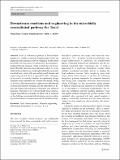Downstream reactions and engineering in the microbially reconstituted pathway for Taxol
Author(s)
Jiang, Ming; Stephanopoulos, Gregory; Pfeifer, Blaine A.
Download253_2012_Article_4016.pdf (316.1Kb)
OPEN_ACCESS_POLICY
Open Access Policy
Creative Commons Attribution-Noncommercial-Share Alike
Terms of use
Metadata
Show full item recordAbstract
Taxol (a trademarked product of Bristol-Myers Squibb) is a complex isoprenoid natural product which has displayed potent anticancer activity. Originally isolated from the Pacific yew tree (Taxus brevifolia), Taxol has been mass-produced through processes reliant on plant-derived biosynthesis. Recently, there have been alternative efforts to reconstitute the biosynthetic process through technically convenient microbial hosts, which offer unmatched growth kinetics and engineering potential. Such an approach is made challenging by the need to successfully introduce the significantly foreign enzymatic steps responsible for eventual biosynthesis. Doing so, however, offers the potential to engineer more efficient and economical production processes and the opportunity to design and produce tailored analog compounds with enhanced properties. This mini review will specifically focus on heterologous biosynthesis as it applies to Taxol with an emphasis on the challenges associated with introducing and reconstituting the downstream reaction steps needed for final bioactivity.
Date issued
2012-03Department
Massachusetts Institute of Technology. Department of Chemical EngineeringJournal
Applied Microbiology and Biotechnology
Publisher
Springer-Verlag
Citation
Jiang, Ming, Gregory Stephanopoulos, and Blaine A. Pfeifer. "Downstream reactions and engineering in the microbially reconstituted pathway for Taxol." Applied Microbiology and Biotechnology 94:4 (May 2012), pp.841-849.
Version: Author's final manuscript
ISSN
0175-7598
1432-0614